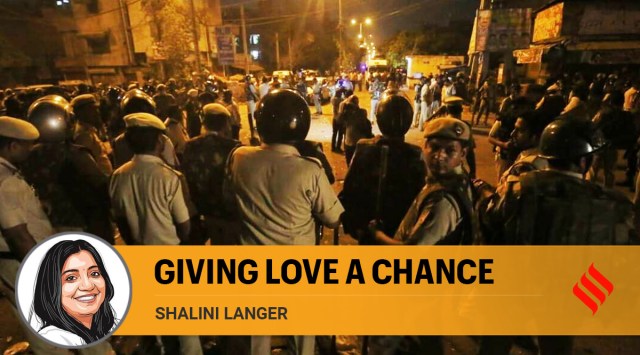
Hate needs loud slogans, blaring songs and increasingly a bulldozer. Love needs no language.
It is perhaps due to this that it is easy to overlook love. Swamped by puny men with their bulging neck veins, desperately seeking valour and validation in roughing up harmless adversaries, it’s easy for us to forget that most people, every day, choose an act of love over one of hate, an act of tolerance over malice, an act of accommodation over exclusion.
I come away full of this hope and music from a recent wedding involving two people from different corners of the world, coming together in a third, smaller part, that seems by every definition far removed from its cosmopolitan counterparts. But here, where the increasingly vicious battlelines of J&K are drawn and redrawn every day, different cultures rushed towards each other, mixing, swirling, rising and bursting forth in a profusion of senses — of smells, tastes and sights — that for those two days made every kind of integration possible.
Hearts were full there, and hearts were open and big. For a bride who could switch from sindoor to dancing shoes, touching feet to swigging wine. For a groom who could leave curly long hair uncut, sport tattoos and piercings, and declare his love in song. For friends and family who spoke at least four languages between them — rendered in four times four accents — but moved in one beat to Bollywood’s evergreen band and baaja.
And yet, even here in the background, a TV set beamed images of mobs clashing in Jahangirpuri in the National Capital — next to where people tucked into paranthas to pancakes, idlis to sausages, in that cornucopia of a hotel buffet. The assembled guests, who had skirted the issue just hours earlier of two religions seamlessly exchanging vows in front of the “holy” fire, turned their eyes away — or vented anger at “those” people who were behind all the violence.
In the hypocrisy of that scene, the food bathed in the warmth of an evening well spent, untouched by any veg, non-veg wars, moved a hijab-wearing restaurant staff. She seemed unfazed with multiple demands of the excited guests, not looking at the TV, but not looking away either from the wariness with which we caught each other’s eye. What if she asked then which kind of inter-faith love had social sanction, and which could not be condoned, I wondered.
But I also could not ignore in the other faces around, across four and more generations, the distance travelled so far already, if not with a leap then with small steps. From the time that the women of the house could not show their faces to “other men”. The veil then shrunk to a head covering, to next a stole flung casually over the chest, to one that could go on and off as per convenience, to sharing the dance floor with one’s in-laws. The lines shifted because love is, above all, generous.
The lines shifted so as to expand the boundaries especially of women’s lives. One afternoon at the wedding, we had around us potential aspirants in everything from the Army to fashion, business to robotics, literature to software, every step taken by them setting them forth from their homes, north to south, east to west. There were no glass ceilings here, only ones that could mirror their hopes.
Many of the paths being forged that afternoon would take these girls to where it all began, with love. For, is not every grisly re-enactment of “love jihad” an affirmation that love always finds a way, cities to villages, colleges to fields, mobiles to postcards. No matter what manly name the latest Sena gives itself as it fights all of two people on the other side.
And when it’s the turn of these girls to stand on that side — add the numbers, house to house, city to city, village to village, college to college — the Senas might find themselves, well, bulldozed.
National Editor Shalini Langer curates the ‘She Said’ column